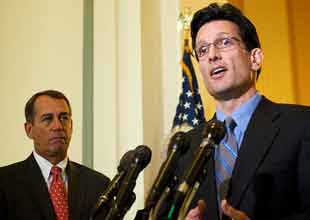
Democrats in Congress fighting to blunt the effects of the Supreme Court’s Citizens United decision face an uphill battle in the 112th Congress. After last year’s defeat of the DISCLOSE Act, which would’ve beefed up disclosure requirements in campaign ads and blocked foreign money from seeping into American elections, new legislative efforts face long odds under House Speaker John Boehner (R-Ohio). But a top House Democrat says lawmakers and reform groups are eyeing a more direct strategy to crack down on the powerful outside groups that were so influential in the 2010 midterms: challenging their tax status.
In an interview with Mother Jones, Rep. Chris Van Hollen (D-Md.), the past chairman of the Democratic Congressional Campaign Committee and one of Congress’ staunchest campaign-finance reform advocates, says Democrats and left-leaning groups are mulling a legal fight that would challenge the tax-exempt status of independent right-wing groups that sprung up in the aftermath of the Citizens United decision. Their targets include groups such as Karl Rove’s Crossroads GPS and the American Action Network (AAN), run by former GOP Minnesota Sen. Norm Coleman, which together spent more than $43 million supporting conservative candidates and attacking Democratic ones, making up 23 percent of all outside conservative spending. “People are looking at different legal strategies through the courts because there’s emerging evidence that these groups have abused the rules,” Van Hollen says.
Rep. David Price (D-N.C.), another backer of campaign-finance reform, echoes Van Hollen. In an interview, he confirms there’s been discussion among Democrats about legal challenges to challenging outside groups, adding, “I think there are ample goals for challenging the way those groups have acted.”
Jonathan Collegio, a spokesman for Crossroads GPS, told Mother Jones that “Van Hollen is irresponsibly making claims on zero evidence whatsoever and this is extremely irresponsible for an elected official holding high office.” A spokesman for American Action Network didn’t respond to a request for comment on Thursday.
Crossroads GPS, AAN, and similar outside spending groups are organized as tax-exempt, not-for-profits whose purpose, under the Internal Revenue Service code, is “primarily to further the common good and general welfare of the people of the community.” Such a group, classified as a 501(c)4, can, however, engage in political advocacy—running ads for or against candidates, for instance—with one major stipulation: that politicking “is not its primary activity.”
That distinction is crucial. Since a 501(c) group doesn’t have to register as a political action committee (PAC), it need not disclose its donors and open up its books to public scrutiny. They operate, more or less, under a veil of secrecy—and so do their donors. But if the Federal Election Commission or the IRS determine a group violated the rules, it would be forced to register as a PAC and disclose the sources of its funding.
The legal avenue lawmakers like Van Hollen and Price are considering wouldn’t be the first challenge to outside groups’ tax status. In late October, Public Citizen, the Center for Media and Democracy, and Protect Our Elections alleged that the Iowa-based American Future Fund violated campaign finance law by not registering as a PAC after a New York Times analysis of AFF’s advertisements showed that 56 percent of its TV budget went toward political ads. A similar coalition of public advocacy groups, led by Public Citizen, filed a similar complaint with the FEC against Crossroads GPS, claiming the group’s “major purpose is to influence the 2010 federal elections and to elect Republicans to office.” (The complaints are still pending.)
In September, Sen. Max Baucus (D-Mont.), chairman of the Senate finance committee, asked the IRS to examine influential 501(c) groups and “ensure that political campaign activity” isn’t their primary activity. “With hundreds of millions of dollars being spent in election contests by tax-exempt entities, it is time to take a fresh look at current practices and how they comport with the Internal Revenue Code’s rules for nonprofits,” Baucus wrote.
Paul Ryan, legal counsel at the Campaign Legal Center in Washington, says the fight over Crossroads GPS and American Action Network’s tax-exempt status will be one of the most closely watched issues of 2011. In order to prove they’re not primarily political outfits, such groups need to hit the airwaves with non-election ads, he says, by taking a stand on a particular ballot proposal or social issue. Crossroads GPS, for instance, bought $400,000 of radio time for ads about extending the Bush tax cuts last December. But Ryan also suggests these groups could take a different approach. “Will they go back and break out ads from election season, saying they were actually issue ads and not political?” he asks.
Craig Holman, a lobbyist with the advocacy group Public Citizen, says challenges to groups like Crossroads GPS must first be made through the Federal Election Commission and the IRS. While he holds out little hope for the perpetually deadlocked FEC, Holman is more optimistic about the IRS’ appetite for investigating outside groups. He hedges that optimism by referencing the IRS’ refusal to investigate another outside group named Americans for Job Security, an outfit that Holman believes blatantly violated the IRS rules. (Stephen DeMaura, who runs Americans for Job Security, didn’t respond to a request for comment.) But, he adds, “I really have a hard time imagining the IRS turning a blind eye to this.”













